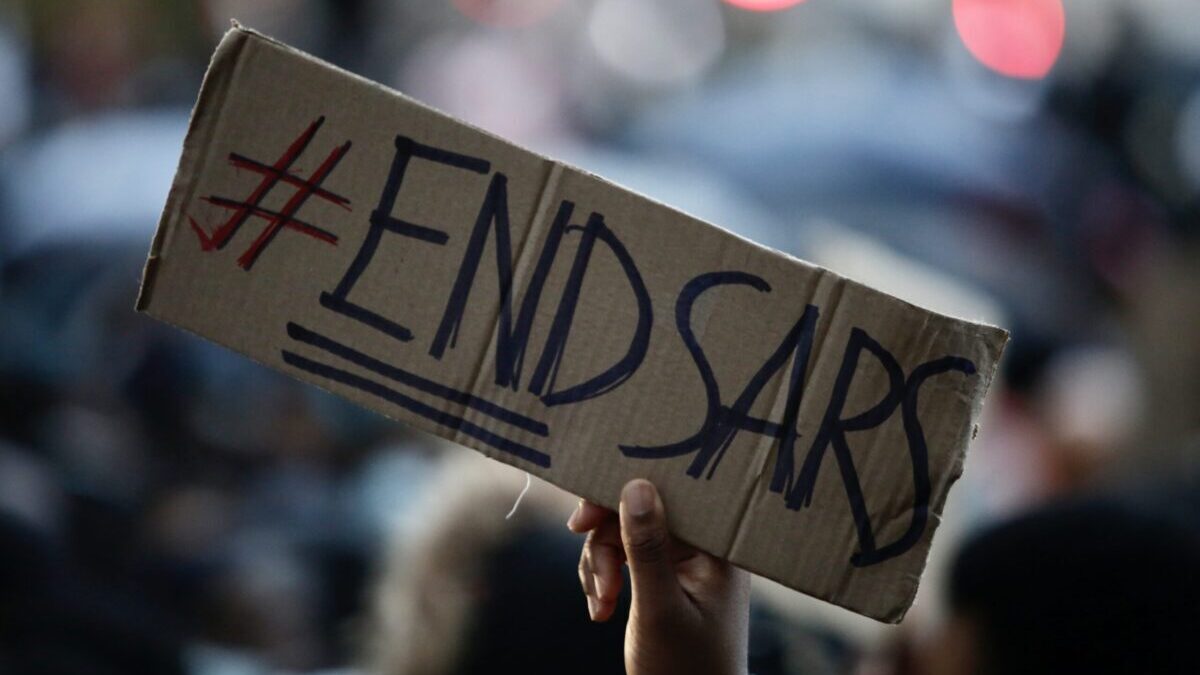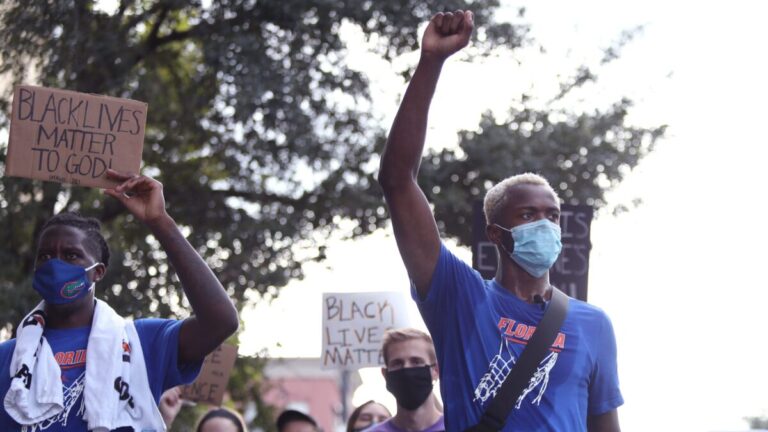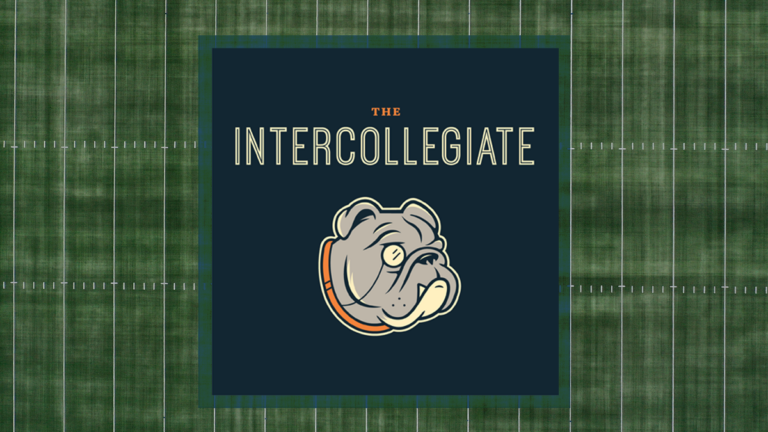How The #EndSars Movement Is Threatening To Disrupt Sports And Business In Nigeria
Why this matters
#EndSARS is a decentralized social movement and series of mass protests against police brutality in Nigeria. The slogan calls for the disbanding of the Special Anti-Robbery Squad, a notorious unit of the Nigerian Police with a long record of abuses.
2020 has been one hell of a year, a crucible in the realm of cataclysm but none in the region of what has been experienced in the biggest country in West Africa, Nigeria. As her economy looked to convalescent from the catastrophe that was COVID-19, the virus which put a stop to all sporting events, businesses, and every other outdoor activity one could think of, another bubble burst.
It was, as it were, that in light of the atrocious, extra-judicial killings and torments being meted out to the civilian, over the years, by the Special Anti-Robbery Squad (SARS), a now-defunct unit in the Nigeria Police Force, the distressed youths led a peaceful revolt starting from October 8th, demanding the government dissolve the body and see to massive reforms in the police which of course should extend to the governance. It started out as a peaceful protest but things soon deteriorated to riots, violence, and blood-shed in a way not seen since the days of the Asaba Homicide as far back as 1967.
Thankfully, a number of international sportsmen including Arsenal midfielder Mesut Ozil, Los Angeles Sparks forward Chiney Ogwumike, UFC champion Kamaru Usman, Manchester United's Odion Ighalo, Indiana Pacers guard Victor Oladipo, Miami Heat center Bam Adebayo, British-Nigerian pro boxer Anthony Joshua and retired NFL player Emmanuel Acho amongst many others all lent their voices, joining forces with the youths as the quest for a peaceful and better Nigeria devoid of police brutality made the headlines across the borders, and thus meant the #EndSars movement more than gained global awareness.
The Inspector-General of Police, Adamu Mohammed was thus forced to disband the unit, though he debriefed that the operatives will be ‘redeployed to other police formations and commands’ didn't go down well and thus, freshly set the cats amongst the pigeons.
The dissolution statement read in part, “In the finest spirit of democratic, citizen-centered and community policing, the Inspector-General of Police, IGP M.A Adamu, NPM, has today, 11th October, 2020, dissolved the Special Anti-Robbery Squad (SARS) across the 36 State Police Commands and the Federal Capital Territory (FCT) where they hitherto existed."
“The IGP, while noting that the dissolution of SARS is in response to the yearnings of the Nigerian people, observes that by this dissolution, all officers and men of the now-defunct Special Anti-robbery Squad are being redeployed with immediate effect.”
However, according to Amnesty International Director Osai Ojigho who more than echoed the thoughts of the citizenry, the dissolution was just a euphemistic representation of the ills of the police force and was not in any way enough.
“The announcement falls short of demands for accountability and justice for abuses committed by the unit and police in general,” Ojigho was quoted as having said to The Guardian.
“The police authorities must state strongly the concrete steps they will take to ensure all officers alleged to have committed human rights violations are investigated and brought to justice.”
With the youths having now vociferously taken their protests to the next level in Lagos, the nation's largest city, blocking off the toll gate and ensuring no movement through the Lekki Concession Company Road, the one major route that connected the Mainland and Island, it meant locomotion for businesses and sporting activities was drastically affected.
As a result, The Lagos State Government headed by Governor Babajide Sanwo-Olu, had to order the suspension of all outdoor activities, declaring a lockdown for 72 hours due to the growing violence in the state. But with the protesters adamant at retreating from their posts in various parts of the states in the country, the peaceful protests soon turned bloody, with the government allegedly said to have played a part in the homicide that ensued.
According to Amnesty International, the CCTV cameras were removed from the Lekki toll gate where the majority of the protesters concentrated on. Thereafter, the Lagos State Government subsequently said these were laser cameras and not CCTV cameras as earlier publicized on the media. In addition, the electricity supplying lights to the toll gate were cut and the advertisement billboards, which are owned and maintained by Loatsad Media, were turned off.
And on the night of 20th October, at around 6:50 p.m, some members of the Nigerian Armed Forces clad in the Army regalia opened fire on the protesting civilians at the toll gate, killing scores and leaving many injured. Amnesty International estimated that at least 56 lives have been lost since the inception of the protests, with 38 of those killings happening on the night of the Lekki Toll shooting.
“The military is shooting at its own people, this is a war and we are fighting against ourselves,” one of the very vocal activists, Folarin Falana said.
“This is the worst thing I’ve seen, I don’t really know how to explain it, in all my life. This country has always been f**cked up but this is the worst.”
Thus, we watched as what started out as a peaceful protest took a twist — enraged 'hoodlums' hijacking the movement leading to the destruction of several police stations in the state, TV Continental station (TVC) reportedly said to be owned by former Lagos Governor Bola Ahmed Tinubu, the Oyingbo bus station amongst other public assets went up in flames. The Lekki Toll Gate where the military mayhem was carried out on the peaceful protesters was also not spared.
And then, the economic fiasco it had created. Billions of naira have been estimated to be lost by the West African nation due to the protests. Manpower hours were lost, properties destroyed and worst of all, lives have been lost.
“With the current protests and roadblocks, we’ve been finding it difficult to move our products. Also on a day-to-day basis, people cannot make it to work and move around the states,” Toheeb Abdulsalam, Chief Executive of Agritech Business Farmignite will business connects international professionals with access to farmland, crops, cultivation, and marketing within Nigeria told African Business.
“It’s affecting a lot of businesses as people are finding it difficult to get to their destinations in time. Two days ago, I was coming from the factory and I spent six hours in traffic.”
Thus, while the economic impact of the protests remains 'limited for now' according to Virág Fórizs, an emerging markets economist for Capital Economics, sustained demonstrations or an escalation could prove much more disruptive and add to the economic pain from the coronavirus crisis and low oil prices.
And then, with the ban on sporting activities in the country having been lifted recently, the League Management Company (LMC), a body which looks after the football activities across all tiers in the country putting forward a proposal for the 2020-21 Nigeria Professional Football League to return on November 15, it remains to be seen if the state of insecurity in the nation could have adverse effects on the routine of player and fan travels across states for the games if the return date is upheld.
Emmanuel Chinaza is an international sports media expert who was featured on The Scuffed Soccer Podcast leading up to the 2019 U-20 World Cup




